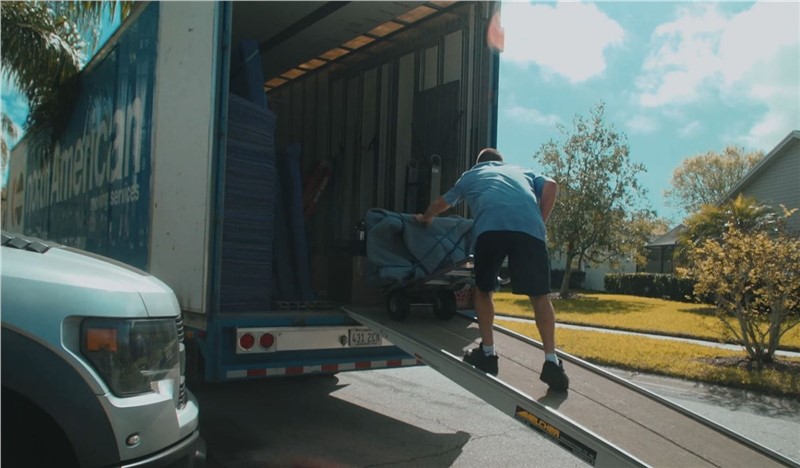Shipping freight vs. courier services: What's best for bulk logistics?
Understanding the Inclusions of moving and Freight Forwarding in the World of Residential and Worldwide Delivery
Guiding through the complexities of moving and Freight forwarding can be challenging. Both procedures entail distinctive procedures and requirements that are essential for effective transportation. Recognizing the differences in logistics, documentation, and risk management is crucial for people and services alike. This expertise can considerably affect the performance and safety of shipments. However, several are unaware of the particular parts that affect the total experience and results. What aspects should one consider to guarantee a smooth transition?
The Fundamentals of moving and Freight Forwarding
moving and Freight forwarding are fundamental parts of the global logistics industry. They help with the transfer of goods and individual items throughout domestic and worldwide borders. moving largely involves the relocation of families or individuals, including domestic and industrial demands. It typically consists of packaging, packing, carrying, and unpacking items at the destination. In contrast, Freight forwarding is concentrated on the delivery of products, usually in mass, using different transportation settings, such as land.freight, sea, or air forwarders serve as intermediaries, collaborating logistics to ensure prompt shipment while steering via complex laws and customizeds procedures. Both processes require careful preparation, organization, and interaction to assure performance and decrease disturbances. Understanding these fundamentals is vital for anyone associated with logistics, as they prepared for advanced facets of shipping and transportation management.
Secret Components of Freight Forwarding Services
Freight forwarding solutions include a number of crucial elements that assure smooth transportation of goods. Key duties of Freight forwarders consist of handling logistics, working with deliveries, and dealing with customs clearance. Additionally, comprehending vital shipping paperwork is imperative for compliance and efficient motion of freight.
Freight Forwarder Responsibilities
A dependable Freight forwarder plays a crucial duty in coordinating the transportation of goods, guaranteeing that shipments are handled efficiently and in conformity with laws. Their duties include different vital jobs, including picking excellent transportation routes, bargaining Freight prices, and taking care of logistics. They serve as intermediaries between shippers and providers, making certain that freight is correctly packaged and identified for risk-free transit. In addition, Freight forwarders track deliveries, providing updates to clients concerning the standing and anticipated delivery times. They also assess and take care of threats connected with transportation, suggesting insurance policy alternatives as required. By facilitating interaction and documents, Freight forwarders streamline the delivery process, reducing potential hold-ups and improving general supply chain efficiency.
Delivering Paperwork Basics

Understanding Customs Clearance and Documents
Accurate paperwork is essential in the customizeds clearance process, as it ensures compliance with various policies. An overview of custom-mades policies highlights the complexities faced by carriers and Freight forwarders. Typical clearance obstacles can greatly impact shipment timelines and expenses, making understanding this facet necessary for effective logistics.
Importance of Accurate Documentation
Steering via the intricacies of global delivery requires a keen understanding of customs clearance and the important duty of documents. Precise paperwork is crucial for ensuring that shipments adhere to policies and reach their locations immediately. Effectively prepared papers, including bills of lading, commercial invoices, and packing listings, help with smooth communications with custom-mades authorities. Errors can lead to shipment delays, fines, and even confiscation of goods. Moreover, detailed paperwork help in tracking shipments and solving conflicts. As a result, organizations participated in moving and Freight forwarding need to focus on precise paperwork methods to navigate the detailed landscape of global shipping efficiently. This diligence not only enhances operations however also improves customer contentment by ensuring prompt shipment.
Customs Regulations Overview
Steering customs laws is an essential element of global profession that directly affects the success of moving and Freight forwarding operations. Reliable personalizeds clearance requires an understanding of different regulations, including tolls, duties, and import/export limitations. Exact documentation is crucial, as it guarantees conformity with legal needs and assists in the efficient activity of items throughout borders. Trick documents company website often include business billings, packing listings, and bills of lading, which supply comprehensive info about the shipment. Furthermore, personalizeds brokers play a vital function in steering intricate laws, serving as middlemans in between customizeds and carriers authorities. By keeping complete understanding of customizeds processes, companies can significantly lower delays and minimize prices connected with international delivery.
Usual Clearance Obstacles
Various obstacles can arise during the custom-mades clearance procedure, typically complicating the movement of products throughout boundaries. One significant problem is not enough paperwork, which can cause hold-ups and penalties. Importers and merchants must assure all needed paperwork, such as billings, packing listings, and certificates of beginning, is total and precise. Furthermore, discrepancies in assessment can cause scrutiny from personalizeds authorities, causing additional responsibilities or examinations. Language barriers might additionally pose obstacles, as miscommunication can cause misunderstandings concerning guidelines. Modifications in customizeds policies can create confusion, requiring consistent alertness by shippers. Eventually, getting over these clearance challenges needs thorough preparation and a clear understanding of custom-mades requirements to facilitate smooth worldwide purchases.
Product Packaging and Labeling Demands
Although typically neglected, packaging and labeling requirements play an essential duty in the delivery process, making sure that items are safeguarded and quickly recognizable throughout their journey. Appropriate packaging safeguards products from damage during transportation, while additionally facilitating reliable handling and storage space. Utilizing proper materials, such as bubble wrap, foam, or strong boxes, can stop damage and loss.Labeling is equally crucial. Clear and accurate labels communicate critical details, consisting of the destination, dealing with directions, and contents. Labels should follow policies certain to domestic and international shipping, which might include unsafe materials recognition or personalizeds declarations.Moreover, standard labeling methods simplify the monitoring process and Get More Info boost general logistics efficiency. By sticking to packaging and labeling needs, businesses lessen the risk of hold-ups, damage, or misdelivery. Eventually, these practices contribute greatly to the success of moving and Freight forwarding operations, guaranteeing a smooth delivery experience for all celebrations entailed
Tracking Shipments: Relevance and Methods
Efficient packaging and labeling set the structure for successful delivery administration, but tracking deliveries is equally essential in the delivery procedure. Shipment tracking provides real-time exposure, which aids companies and customers keep track of the development of their products. This transparency enhances consumer complete satisfaction, considering that clients can stay educated about shipment timelines and any kind of potential delays.Several approaches assist in reliable monitoring. Barcode scanning is a common method, using special identifiers to keep track of plans throughout their trip. Additionally, GPS innovation allows accurate area monitoring, enabling prompt updates and boosted logistics monitoring. Numerous delivery companies now supply digital platforms and mobile applications that supply individuals with easy access to tracking information.The significance of delivery tracking can not be overemphasized; it decreases the threat of shed or damaged goods, improves operational performance, and fosters count on between shippers and receivers. Therefore, incorporating reliable tracking techniques is essential for effective domestic and worldwide shipping operations.
Insurance coverage Options for Your Goods

Safeguarding insurance policy for goods en route is a vital factor to consider for individuals and organizations alike. Insurance coverage alternatives vary based on the kind of delivery, worth of goods, and details risks included. Usual kinds consist of copyright obligation, which covers loss or damages while en route, and full-value insurance coverage, giving comprehensive insurance coverage for the complete value of the goods.Shippers may likewise consider aquatic insurance for worldwide shipments, securing versus threats related to sea transportation. It is necessary to examine the details demands of the shipment and assess the conditions of any policy.Furthermore, comprehending exclusions and limitations is important to avoid prospective spaces in coverage. Shippers must involve with insurance coverage professionals to discover customized options that fit their one-of-a-kind situations. Eventually, investing in the ideal insurance can reduce economic dangers and click for more info supply comfort during the delivery process.
Selecting the Right moving and Freight Forwarding Solution
When picking a relocating and Freight forwarding solution, it is crucial for companies and people to carefully evaluate their particular needs and priorities. Aspects such as the quantity of items, destination, and timeline play a substantial function in this decision-making procedure. Looking into different service providers is a good idea; comparing their solutions, pricing, and customer reviews can reveal valuable insights.Additionally, it is needed to consider the experience and knowledge of the provider in dealing with specific kinds of freight, particularly for global shipments that might include custom-mades clearance. Transparency in rates, consisting of any kind of concealed charges, must likewise be scrutinized.Furthermore, reviewing the degree of client support offered is important, as timely interaction can mitigate issues throughout transit (lcl shipping). Verifying the availability of insurance coverage choices ensures that goods are safeguarded throughout the delivery process. By taking these companies, individuals and actions can make informed options that line up with their logistics needs
Regularly Asked Questions
What Sorts Of Product Can Be Shipped Worldwide?

How Do Delivery Prices Range Various Providers?
Shipping prices differ significantly in between service providers as a result of elements such as solution speed, freight kind, distance, and additional services supplied. Each provider's pricing design reflects these variables, influencing total delivery expenses for customers.
Can I Ship Hazardous Materials or Perishables?
Delivering unsafe products and perishables goes through strict laws. Service providers often need certain packaging, labeling, and paperwork. Carriers need to ensure compliance with regional and international legislations to stay clear of charges and assure safe transportation.
What Should I Do if My Delivery Is Delayed?
When confronted with a delivery delay, one need to first call the service provider for updates. Assess any type of alerts obtained, examine different remedies, and keep all events notified about the circumstance to decrease disruptions.
Are There Weight Purview for Shipping Containers?
Weight limitations for delivery containers differ relying on variables like container size and shipping policies. Usually, conventional containers have an optimum gross weight of around 30,000 to 32,000 kilos to guarantee safe transportation and handling. In contrast, Freight forwarding is focused on the shipment of goods, frequently in bulk, using different transportation settings, such as air, sea, or land.Freight forwarders act as intermediaries, collaborating logistics to ensure timely delivery while maneuvering via complex policies and customs treatments. Secret obligations of Freight forwarders include handling logistics, working with deliveries, and taking care of customizeds clearance. A dependable Freight forwarder plays a vital function in coordinating the transport of items, making sure that shipments are dealt with efficiently and in conformity with policies. Reliable product packaging and labeling set the structure for successful shipment management, but tracking deliveries is equally necessary in the delivery process. Lots of shipping business now use digital platforms and mobile applications that offer customers with simple access to tracking information.The relevance of shipment tracking can not be overstated; it decreases the risk of lost or damaged items, enhances functional effectiveness, and fosters trust fund between shippers and receivers.